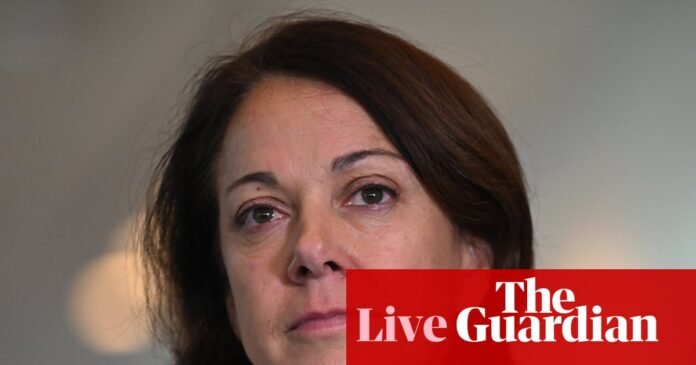Sophie Scamps says ‘now is the time’ to recognise state of Palestine
The independent Mackellar MP says her office has been “inundated” with letters about what is happening in Gaza and that people are “distressed, distraught, horrified” by news coverage of its civilian population.
“People really want to see Australia act to end what is happening in Gaza. What we are seeing on our television screens absolutely shames us all and I think we can say words are not enough. We need to take further steps,” the independent MP told the ABC a short time ago.
She says she “hears” the prime minister’s concerns, voiced earlier in question time about the recognition of a Palestinian state – but that “now” is the time to do so.
The demilitarisation of Hamas and release of hostages are important to recognising the Palestinian state, but I hear the prime minister – it is, of course, a very difficult question when to recognise Palestine as a state but I do feel that now is the time. I mean, how much horror can be inflicted upon the people of Palestine before we actually take one of these steps?
We need to start doing things differently because what is happening now is utterly horrific … We need more than words, we need actions and one of those steps to get action and peace is if we start that peace process by recognising Palestine has a right to self-determination.
Key events
Greens deputy leader unapologetic over senate protest
Mehreen Faruqi says “it is time” for the prime minister to recognise the state of Palestine – and that she will not be apologising for last week protesting during the governor-general’s speech at the opening of parliament.
In an Afternoon Briefing episode dominated by the question of Gaza, the Greens deputy leader told the program she wears the “sanction and the punishment” handed to her by Labor after her protest as a “badge of honour”.
“I will not be apologising and will be using every single opportunity and tool available for me to raise the genocide in Gaza, to bring attention to the forced and deliberate starvation of children who are basically dying of starvation in Gaza,” she told the ABC.
The Labor party hates it that in a couple of minutes I brought more attention to the genocide that Israel is committing in Gaza than they have done in two years.
My office has been flooded by phone calls, messages saying they agreed with me and they had been calling Senator Wong and the prime minister’s office to again raise the issue with them and it is this pressure that is finally making the prime minister using some stronger words, but these words are not enough. These words are not going to feed starving children.
Read more here:
Sophie Scamps says ‘now is the time’ to recognise state of Palestine
The independent Mackellar MP says her office has been “inundated” with letters about what is happening in Gaza and that people are “distressed, distraught, horrified” by news coverage of its civilian population.
“People really want to see Australia act to end what is happening in Gaza. What we are seeing on our television screens absolutely shames us all and I think we can say words are not enough. We need to take further steps,” the independent MP told the ABC a short time ago.
She says she “hears” the prime minister’s concerns, voiced earlier in question time about the recognition of a Palestinian state – but that “now” is the time to do so.
The demilitarisation of Hamas and release of hostages are important to recognising the Palestinian state, but I hear the prime minister – it is, of course, a very difficult question when to recognise Palestine as a state but I do feel that now is the time. I mean, how much horror can be inflicted upon the people of Palestine before we actually take one of these steps?
We need to start doing things differently because what is happening now is utterly horrific … We need more than words, we need actions and one of those steps to get action and peace is if we start that peace process by recognising Palestine has a right to self-determination.
‘Evidence pretty overwhelming’ of shortage of food in Gaza, Dave Sharma says
Dave Sharma says the “evidence is pretty overwhelming” that people in Gaza are suffering from a shortage of food – but does not go as far as using the word “starvation” to describe what the enclave’s population faces.
The Liberal senator and former ambassador to Israel told the ABC a short time ago:
I don’t believe Israel has stopped food from being delivered – or at least my understanding is that has not been the policy intent, but undoubtedly the level of humanitarian hardship in Gaza has skyrocketed over the last few months and I believe the reports we are hearing of hunger, food insecurity, malnutrition are credible and we need to be acting in response.
“I think the evidence is pretty overwhelming that there’s a high … there’s malnutrition, there’s shortages of food,” he said.
The question of who was to blame for the suffering was open to discussion, he said, but the civilian population of Gaza should not “be held hostage, so to speak, because of those discussions”.
I’m pleased that Israel has taken steps in the last 24 hours to withdraw military operations from some areas and to allow and assist food drops by air by neighbouring countries as well. I think that shows you that they recognise that this is a problem.
‘I cannot see how we cannot be helping’, Australian MSF worker says of Gaza
An Australian Médecins Sans Frontières worker has described Gaza’s “emaciated” population.
Claire Manera, an emergency coordinator for MSF, told the ABC doctors in Gaza sometimes received warnings from the Israeli authorities about areas they were to bomb but at other times the team “received no warnings at all”.
Manera, speaking from Perth, said alongside that danger it was “horrifying” to see people in the streets and in the hospital “absolutely emaciated”.
I would also be seeing babies and their parents standing by without being able to do anything to help them. This was on top of the third degree burns they [were] experiencing from having bombs dropped on their homes, so just innocent people and so many of them children in agony.
She will return to Gaza in coming months, she said.
“It is a huge risk, but the Palestinian staff are incredibly brave themselves. I feel like I cannot turn my back on them now and the world should not either,” she told Afternoon Briefing.
I know that they get up every single day to try and do their best to do their jobs and to work for MSF and help each other, so I cannot see how we cannot be helping them either. They are innocent and defenceless.
Albanese in parliament on Israel-Gaza
Here’s video of the prime minister calling on Israel to “comply immediately with its obligations under international law”.
Speaking on the recognition of a Palestinian state, Anthony Albanese said in question time a little earlier the decision must advance the “realisation of that objective”.
“It must be more than a gesture,” he said.

Natasha May
Health minister Mark Butler rejects Cleanbill report’s estimates on GPs’ bulk-billing
Continuing on the subject of GP clinics bulk billing, the health minister, Mark Butler, has rejected Cleanbill’s figures.
In its report, Cleanbill acknowledges it can only provide “an insight into the likely outcome of the bulk billing incentive expansion” in the context of what is “an extremely complex policy change, taking place in the context of other complex policy changes at all levels of government.”
The report noted other factors that could affect a clinic’s decision such as circumstances where an increase in patient numbers resulting from switching to a fully bulk billed model would make receiving a lesser payment for each consultation economically viable, as well as the effect of state-based incentives (like the NSW Bulk Billing Support Initiative) further improving the economic viability of moving to a fully bulk billed model.
Butler called Cleanbill’s analysis “fundamentally flawed and should not be reported as accurate”, also pointing to the company’s terms of use where it states “Cleanbill does not make any representations, warranties or claims that the material contained on this website is reliable, accurate, complete or suitable.”
Cleanbill collects its information, according to its founder, James Gillespie, by compiling a list of general practices nationally, which it calls to ensure it is an operating GP clinic, ask if it bulk bills adult patients and, if not, what out-of-pocket fees it charges. Data managers then check that information against what is stated on clinics’ websites and repeat calls until they can ensure consistent information.
Butler said:
Our policy is modelled by the department and based on actual Medicare data. We know this investment will work, because it has already worked for the patients the incentive already applies to: pensioners, concession cardholders, and families with kids. When they went to the GP last year, more than 9 out of 10 GP visits were bulk billed for them.
You can read more about the difference in how the government and Cleanbill measure bulk billing in this article.

Natasha May
New report predicts only 740 GP practices will switch to universal bulk-billing despite Medicare changes
It won’t make economic sense for two in three GP clinics to be fully bulk-billing even with the government’s upcoming Medicare changes, a new report from Healthcare directory Cleanbill shows.
When the government announced its record $8.5bn investment in Medicare to expand the bulk-billing incentive beyond children and concession patients in February, GPs immediately warned not all practices would take up the offer when the changes came into effect in November.
The government said its modelling showed nine out of 10 GP visits would be bulk-billed by 2030, which would boost the number of fully bulk-billed practices to around 4,800 nationally. However, Cleanbill’s new report predicts only 740 GP practices will switch to universal bulk-billing.
Based on the number of GP clinics Cleanbill lists in its database, its analysts have compared a clinic’s current standard consultation fees to the relevant value of the new total Medicare reimbursement a clinic would be entitled to if it bulk-billed all patients, taking into account how the payment scales based on how remote the clinic is.
Out of the 6,212 GP clinics across the country in its database, Cleanbill says 1,341 were fully bulk-billing at July 2025. With the government’s investment it will make economic sense for another 740 clinics to switch to fully bulk-billing, bringing the total number nationally to 2,081, according to the report.
While they estimate the change will see over 200 clinics making the switch in NSW and Victoria respectively, for the ACT they estimate it would only be a single clinic making the change – raising the number of fully bulk billing GP clinics from four to five in the ACT.
The economic effect of the bulk billing incentive expansion would need to be between 20% and 30% higher for the promised 4,800 clinics to become fully bulk billing as a result of the change, the report found.
You can read more about the situation GPs are facing here:
Thank you, Krishani Dhanji. I’m Daisy Dumas – let’s get straight on with the remainder of the afternoon’s news.

Krishani Dhanji
Thanks for joining me on the live blog today, I’ll leave you in the very capable hands of Daisy Dumas.
I’ll see you bright and early in the morning!
Tl;dr what did we learn in question time today?
-
The Coalition didn’t have a strong theme today on their questions to the government – there were a couple on tariffs, on tax and on bulk-billing rates.
-
QT started a bit slow, there wasn’t a whole lot of energy amongst the government or opposition in the first half, but it started getting a little rowdier towards the end.
-
The government used its dixers to tout its policies from cost of living to Hecs discounts to its PBS legislation – and managed to get the Coldplay couple into Hansard too.
-
Tim Wilson called Albanese “this guy” during his question, which did not go down well with Speaker Milton Dick, but there were no ejections from either side of the chamber in question time today.
Question time ends
Following a final dixer on the government’s future made in Australia policy, question time ends for the day.
Labor questioned on funding for Great Southern Reef amid algal bloom in SA
Rebekha Sharkie gets the next crossbench question, and asks whether the government will increase funding for the monitoring of Great Southern Reef, as the algal bloom affects South Australia.
Tony Burke (representing the environment minister, Murray Watt, who’s in the Senate chamber), says while most people know the Great Barrier Reef in Queensland or the Ningaloo reef in Western Australia, the Great Southern Reef isn’t as well known.
He says there’s been $14m committed to South Australia to deal with the algal bloom and there’s other money to support the reef.
There is significant research and conservation projects which do touch on the Great Southern Reef. The projects … they’re not limited to it but a whole lot of their work is within the Great Southern Reef.
Tim Wilson on the CFMEU
Tim Wilson can’t even get through his first question without being sat down.
The shadow minister for small business starts with: “My question is to the prime minister, or this guy,” he says gesturing to Albanese. Politics nerds will know you never refer to an MP as anything other than the “member for …” or “minister”.
So Milton Dick’s not a fan of Wilson’s “this guy” and says there should be more respect in the chamber, while one Liberal MP tries to say “he’s a new member!” (but of course Wilson returns to parliament after losing his seat in 2022).
His actual question goes to the CFMEU:
Will the CFMEU’s plan to unionise the New South Wales residential housing sector increase prices or decrease prices?
The PM puts the blame on the opposition:
Those opposite presided over 10 years of growth in the power of John Setka in the CFMEU construction branch. Three weeks after I became leader of the Labor party, in 2019, I kicked John Setka out of the Labor party.
Labor and Greens in Senate spar over Gaza response

Sarah Basford Canales
Tensions between Labor and the Greens over how to respond to Gaza are continuing into a second sitting week over in Senate question time.
Greens senator David Shoebridge asked the government’s upper house leader and foreign affairs minister, Penny Wong, when the government will sanction Israeli prime minister Benjamin Netanyahu’s security cabinet.
Wong began:
The catastrophic situation in Gaza has gone beyond the world’s worst fears, and we know that Australians and people around the world are distressed and angry about what is occurring, including the ongoing violence and the deaths of so many innocent civilians, and this is unacceptable. As the prime minister said … it is a breach of international law to stop food being delivered, which is the decision that Israel made in March. I would add to that, it is also a breach of decent humanity. It is a breach of decent humanity.
Shoebridge asked Wong a follow-up question about what steps the Australian government has taken to ensure the Pine Gap facility isn’t being used to assist the Israeli military.
Wong responds:
I understand that the Greens are desperate to try and gain domestic political traction from this conflict, and so desperate that they would … make the assertions that are being made, which are not responsible and are inaccurate. Senator Shoebridge, I think we all understand some of the political tactics, including by the opposition, in relation to this conflict. I think most Australians are appalled by what they see, but also recognise that they don’t want the conflict reproduced here by people making inaccurate statements like the one you just made.
Albanese says recognising state of Palestine ‘must be more than a gesture’
When will Australia recognise Palestine as a state?
That question comes from independent MP Sophie Scamps, after the prime minister issued some of his strongest language on Israel over the weekend, but said it wasn’t yet time to recognise a Palestinian state.
Albanese says, as Penny Wong did last year, that the recognition of a Palestinian state might come before the “finalisation of the peace process”.
Israel’s denial of aid and the killing of civilians, including children seeking access to water and food, cannot be defended, nor can it be ignored. We have called upon Israel to comply immediately with its obligations under international law. We have also unequivocally condemned Hamas and said it can play no role whatsoever in the future state of Palestine and hostages must be released immediately …
The timing of a decision to recognise the state of Palestine will be determined by whether that decision advances the realisation of that objective. It must be more than a gesture. It must be something that’s a part of a moving forward. Australia will make that decision as a sovereign state. We obviously are in discussions with other countries as well going forward.






